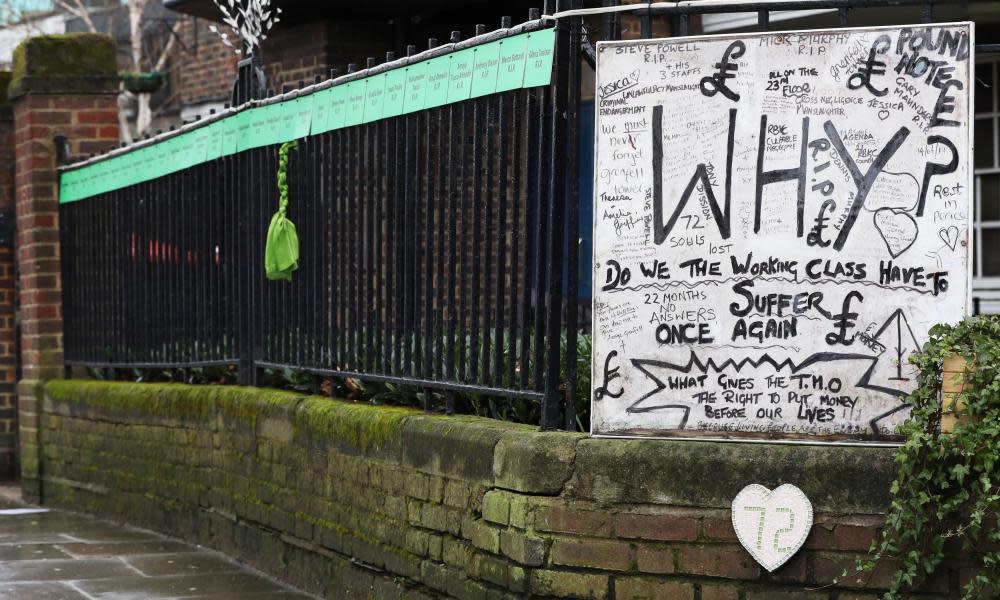Grenfell landlord didn’t take ‘risk of another fire seriously’, inquiry told

The landlord of Grenfell Tower took five years to replace a smoke ventilation system that the London fire brigade said had suffered “catastrophic failure” in a fire in 2010 that spread smoke across 11 storeys and injured three people, the inquiry into the disaster has heard.
The Kensington and Chelsea Tenant Management Organisation (KCTMO) was told by the LFB that the system needed a full test after it failed causing injuries to residents, including Sayeda Ahmed who lived in flat 156. She received an admission of liability from the council landlord after she inhaled heavy smoke that had spread from the fire on the sixth-floor landing, the inquiry heard.
But the smoke extractor was not replaced until the refurbishment and only after the TMO admitted in 2015 that the fire alarm and ventilation system were “beyond economic repair”. The system broke down again six days before the fire that claimed 72 lives, many from inhalation of smoke and toxic gases.
“Even after they admitted liability, I was sure that they were not taking the risk of another fire seriously,” Shahid Ahmed, Sayeda’s husband, told the inquiry. “I was scared for all of the residents.
“There seems to have been an extraordinary delay … when KCTMO/RBKC [Royal Borough of Kensington] knew the smoke ventilation system was not fit for purpose but did nothing about it,” he said.
Ahmed was the chair of the Grenfell Tower leaseholders’ association (GTLA) and alleged that for years before the catastrophic 14 June 2017 fire that the TMO was unresponsive to resident concerns about safety, and criticised its complaints process.
“I thought that the complaints procedure was a way for the TMO to be judge, jury and executioner,” he said. “Their strategy was to refer me to the complaints procedure and exhaust GTLA. I felt that their replies never gave sincere attention to GTLA’s serious and grave concerns in Grenfell Tower. The complaints I made never achieved anything. That was why I repeatedly requested that Grenfell Tower be subjected to an independent health and safety review in 2017.”
Related: Grenfell resident who raised fire concerns labelled troublemaker, inquiry told
In spring 2017 Ahmed drafted a statement, with the help of a barrister, to the housing ombudsman and others titled “Health and safety and serious fire risk hazard”. It raised concerns about gas pipes being installed in stairways, the safety of the evacuation system and lift breakdowns.
In March 2017 the TMO again refused his request for independent safety checks on the tower.
“The TMO knew very well that the residents could not afford to hire an independent expert without assistance,” Ahmed said. “We were completely reliant on the TMO’s goodwill, and because they would not seek an outside opinion we only had whatever they told us, which we did not trust. The real problem with Grenfell Tower was not the age or state of the building, it was the attitude of RBKC and the TMO.”
The inquiry also heard about the TMO’s communication with non-English speakers in the tower. David Noble, a policy and diversity adviser at the TMO, said there were very few translation requests for tenants’ newsletters, even though some contained important fire safety guidance.
“Did the fact of low translation requests cause any concerns that residents could understand information being provided,” he was asked by counsel to the inquiry.
“No, not particularly,” he replied.
The inquiry has heard already that 52 of the 120 flats had disabled occupants. But on the night of the fire a TMO document only listed 10 disabled residents.
Noble was asked: “In light of the limited resident profile information that was available on the night of the fire, would you accept that … there was a failure of the TMO’s equality and diversity policy to enable full, complete and accurate information to be available about residents’ vulnerabilities in the event of an emergency?”
“You could view it that way, yes,” said Noble. “There were a lot of problems.”
The inquiry continues.

 Yahoo Movies
Yahoo Movies 
